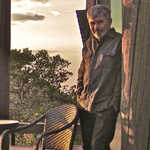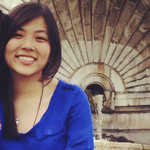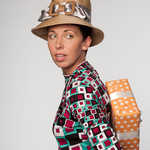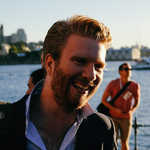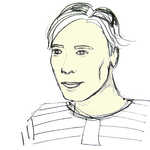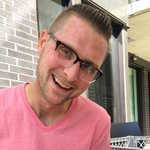

The first thing I noticed when I arrived at Tel Aviv's Ben Gurion airport on Wednesday were the balloons.
June 1st, 2014, 11am
It was 25°C with scattered clouds. There was moderate breeze.
Everyone waiting at the arrivals gate seemed to have them. They were attached to prams and backpacks, tied around toddlers’ arms, and clustering on the ceiling. The usual atmosphere at airport arrival gates is hurried, impersonal, a sense of people very impatient to get away. At Ben Gurion, the arrivals gate felt like a big family gathering, as if every single person here had come to pick up much-loved relative who’d come to Israel for a wedding.
Incidentally, that’s what I was here for, even though no family with balloons were awaiting me. Miriam, one of my oldest friends and partner in one of my biggest lifetime adventures, was getting married, to an Israeli man she’d met in South America and fallen madly in love with.
Miriam and I had moved from Munich to Barcelona together after finishing school at 18. We’d rented and furnished (or rather, “furnished”) our first own flat together, had hunted for and shared jobs, been excited and worried about the future. Because we did worry about the future quite a bit in those days. It was always about choice and preference: what should we study? What were we good at? What did we like? The sense that now was the moment to choose the path that would determine the rest of our lives weighed heavily on our shoulders. I was always the one who searched for a vocation, personal fulfilment through work. I know Miriam felt pressured to take the same approach, but somehow, it never felt right for her. How should she employ her great language skills, her love for people? As a nurse? An interpreter? An international events coordinatr? We spent hours sitting at our living room table, me questioning her, writing lists of strengths and weaknesses and trying to match them to possible careers, but those sessions always ended with a shrug, a “meh”, a slight sense of despair.
The second thing I noticed when I arrived in Tel Aviv on Wednesday was that everyone was wearing flip flops. I noticed it mainly because I’ve just spent some time in Tokyo, where impeccable looks and behaviour are of such great importance. Not so in Tel Aviv. In fact, Tel Aviv may be the polar opposite of Tokyo: it’s crumbling and dirty and noisy, people are either very rude or very friendly, depending on their mood, and no-one seems to care much how they look. It’s as if everyone here were on a beach vacation. The only thing the two have in common, as far as I can tell, are above-ground power lines.
Miriam and I parted ways, geographically speaking, after a year: I moved to London to attend university, she dabbled in a couple of degrees in Barcelona and eventually, reluctantly and under what I think was increasing pressure from her mother, moved back to Germany to study there. I returned to Barcelona and started working in magazines, she travelled the world, met Niv (her husband), moved to Madrid and then Israel. She’s been in and out of jobs, I’ve been in and out of relationships. We’ve been seeing each other once a year, usually for a coffee or drink when we both go back to Munich for Christmas, but ours is the kind of friendship that doesn’t need much more face time: whenever we get together, we simply pick up right where we left off last time.
Tel Aviv strikes me as a place for people who value living over work. It’s like Ibiza without the druggies and posh pseudo-hippies: laid-back, free and very, very sincere. Above all, it feels like the perfect place for Miriam, even though it took her wedding for me to fully realise this.
Israeli weddings usually take place in the evening during the week; people go there after work and home early enough to go to work again the next day. Understandably, Miriam and Niv didn’t want that, and they’d managed to find a place in the mountains near Haifa that would allow us to have the wedding on a Friday. We’d start early, giving the guests who adhere to the shabbath the chance to get home in time for sunset. Everyone else would party on until 7pm, at what point we’d all pick up our shoes and glasses and move from the kosher to a non-kosher area behind a fence, where we’d continue to party until we dropped.
And oh my, did we party.
That this wedding would be different from any other wedding I’d been to became clear when I arrived at the bus stop and couldn’t identify our group because no-one looked like they were actually going to a wedding. Men were wearing shorts and flip flops, women weren’t wearing make-up or heels. The ceremony was secular, unpolished and heartfelt. We all laughed and cried a lot. What followed was half a day of euphoric debauchery that we agreed, in a slightly shaken and stunned state the next day, was probably the best party we’d all been to in our lives. Not because of the music or the alcohol or the many hours of barefoot dancing, but because everyone there was sincerely, truly happy. I never thought I’d write these words, but there you go: there was love in the air.
And that is how it struck me, 12 years after we sat at our living room table in Barcelona and fretted about the future, that Miriam has found her place in life. It has nothing to do with careers and strengths and weaknesses. Miriam cares about people in a way that very few of us do. And she has found a place where people care back. Where they come to pick up their friends and family with balloons at the airport. Where appearances don’t matter much, but relationships do. She has found happiness where, at 18, we’d have never thought of looking. It has all worked out.

